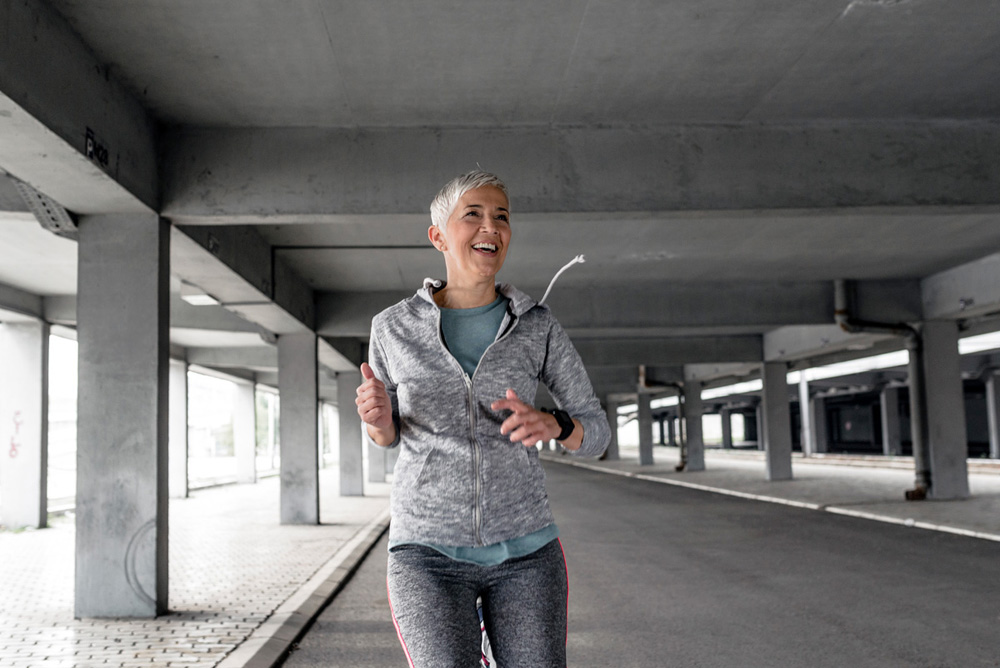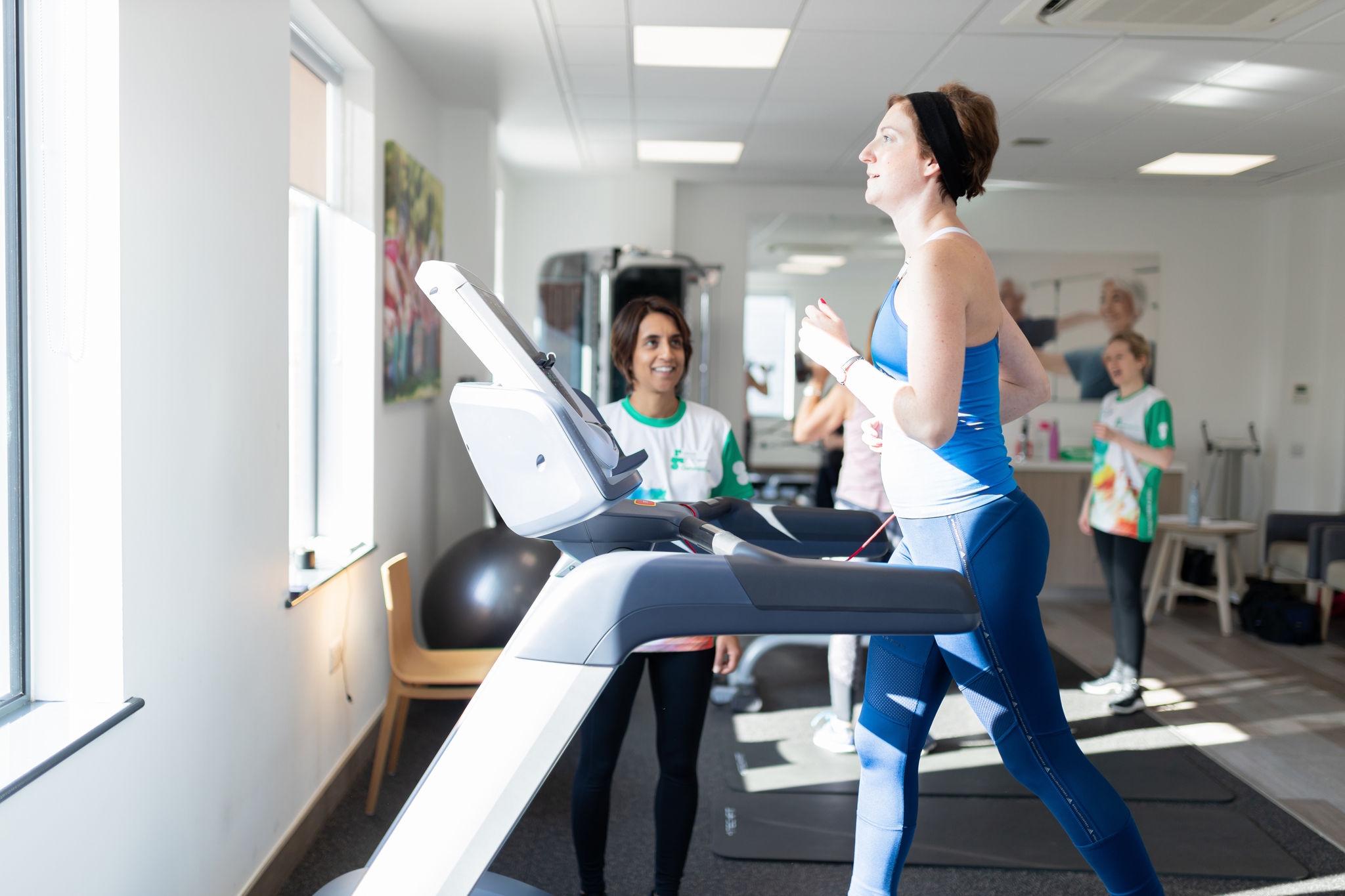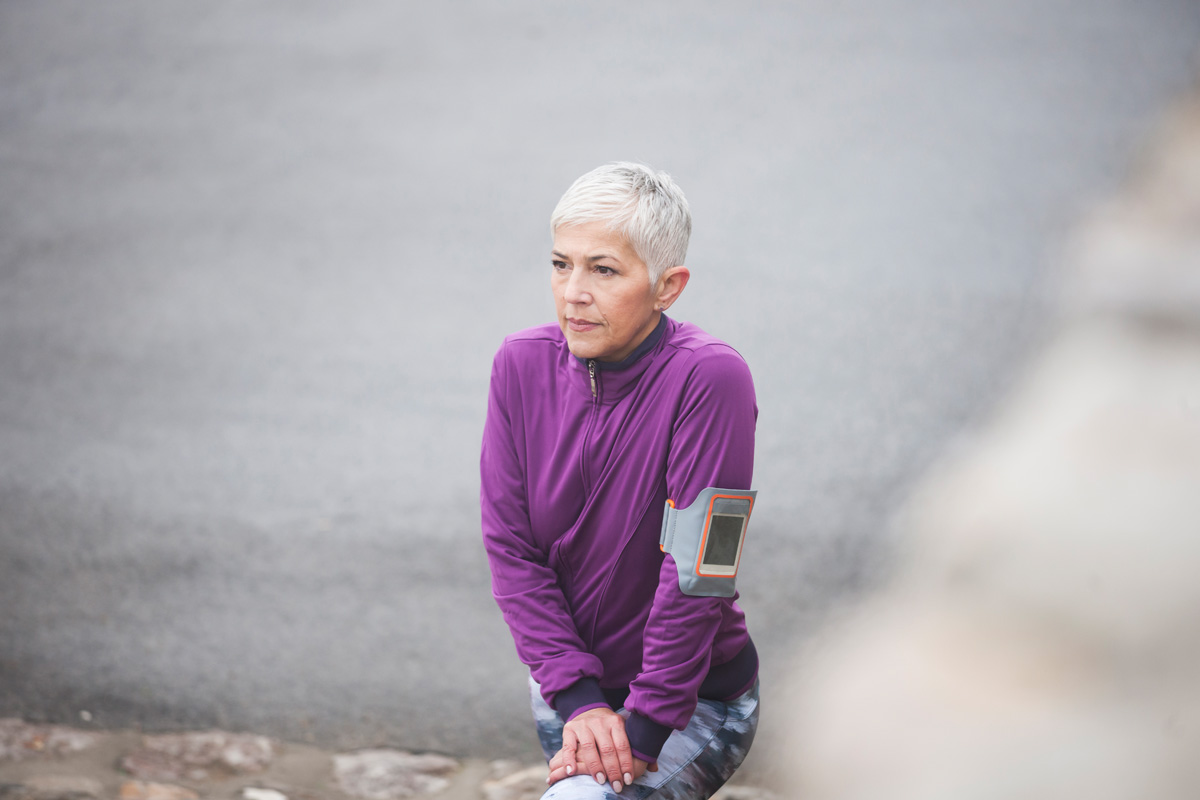- Patients
- Integrative cancer care
- Exercise medicine

Exercise medicine
Supervised exercise medicine is an integral part of your cancer care. Before, during and after your treatment. At no extra cost.
What is exercise medicine?
Exercise medicine is proven to give cancer patients the best possible life outcomes, by helping your body to heal itself. It can make some therapies work more effectively, speeding up your recovery. And it can also mean you have a better quality of life after your treatment, with less chance of the cancer returning.
The evidence for prescribing exercise medicine
Several studies have found that people who exercise during treatment report less fatigue and a better quality of life compared to those who do not.
A study, published in 2017, that looked at the effects of exercise on quality of life and physical function suggested that supervised exercise effectively improves both. (1)
Research carried out by the Australian Association for Exercise and Sport Science suggested that taking part in regular moderate exercise has both mental and physical benefits both during and after cancer treatment. (2)

How does it work?
Once you’re referred to GenesisCare for your treatment, we’ll make an appointment for you to see one of our qualified physiotherapists. They’ll work with you to prescribe a 12-week personalised plan focusing on your side effects, the goals you want to achieve and the physiological outcome you can achieve. The personalised plan includes both aerobic and resistance training, these activities have been clinically proven to provide the most benefit. All our physiotherapists and personal trainers have had specific training in exercise medicine for cancer patients – so you’re in safe hands. Once you start, your physiotherapist will track your progress through reporting on validated outcome measures, these will be taken on your first and last session. They’ll also pass on any relevant information to your consultant.
Our on-site clinics provide easy access to training and equipment and offer:
- Air conditioned exercise suites so you stay cool and comfortable
- A choice of music to exercise to
- An opportunity to meet others
- A programme you can continue after the 12-week prescription, helping you to benefit from a healthier lifestyle after your treatment has finished
- You can exercise before or after your chemotherapy or radiotherapy treatments, or at an alternative time to suit you.
The exercise medicine app
We believe care should be available when and where you need it most, so throughout your treatment, you’ll have access to our free exercise medicine app powered by Technogym Mywellness. With this support, we can ensure you get to experience the benefits of exercise, even when you’re not visiting us in person.
If you’re unable to attend one of our centres regularly, you can access virtual exercise programmes, personalised to you, which help you build and maintain muscle mass during cancer your treatment and beyond. The app collects data which helps us monitor your progress. It’s straightforward to use so you can easily track your own improvements and link your wearable fitness trackers. As well as allowing us to support your physical recovery on a daily basis, the app offers you a familiar face and helps retain a sense of community.
We’ve received extremely positive feedback about the app since its launch in March 2020, with 100% of respondents said that our exercise team offer “the right amount of contact” during lockdown. Many patients who use our app also report a huge increase in how they feel about their health.
The exercise medicine app is already being used in eight of our UK centres, and will be introduced to the rest of the network by the end of 2021.
Thanks to the app, we’re able to continue prescribing exercise sessions and retain a sense of support, which is so important during treatment.
- Joshila DeVile, Head of Exercise Medicine at GenesisCare
Tracey's experience of the Exercise Clinic
The Exercise Clinic helped Tracey with her mental health and wellbeing. Tracey tells about her friendships formed through the Exercise Clinic and that Joshila, the Exercise Clinic Lead arranged for her to attend the Exercise Clinic in Australia when Tracey had to make an unplanned visit to her Mum.
It not only built up my muscles that I felt had fatigued during my treatment but it also gave me some confidence back.
- Tracey
What are the benefits?

Before surgery
We recommend that you begin exercising before your treatment, even if it’s just a short programme. It can help to prepare your body for surgery, lead to a faster recovery and can:
- Improve your balance
- Increase your muscle mass and overall strength, meaning you’ll have fewer side effects from treatment
- Maintain your general fitness so that everyday activities are easier to do
- May help to preserve your bone strength
During treatment
It’s perfectly safe to exercise during your radiotherapy or chemotherapy treatment. Benefits include:
- Treatment may be more effective – exercising just before your session increases blood flow through the tumour so treatment works better
- Managing the side-effects of radiotherapy and chemotherapy, including fatigue
- Preventing, reducing or reversing the side-effects of hormone therapy, including bone loss and fat gain
- Helping your body to produce healing chemicals to correct the imbalances that cause disease
- Reducing anxiety and improving your overall mood

After treatment
After your treatment has finished, carrying on with your exercise plan can help to:
- Speed up your recovery
- Regain muscle strength and overall fitness
- Manage any long-term side-effects
- Improve your quality of life
- Stay healthy in the future
What to expect:
What happens during an exercise session?
For your first appointment, come dressed ready to exercise. Your physiotherapist will explain your exercise prescription and show you how to use the equipment correctly and safely. They will then:
- Check your current fitness levels
- Design your personalised plan – 45 minutes of exercise, twice a week for 12 weeks – to support your treatment plan and help you achieve your goals. Your plan may involve walking/running on the treadmill, riding a static bike, exercises to improve muscle strength and working on your own goals
You may need more than one session with your physiotherapist before you feel confident.
Ongoing exercise appointments
You’ll have supervised sessions in a group. Your physiotherapist and personal trainer are always available to offer support – you won’t be left to exercise alone.
When treatment has finished
Once you’ve completed your treatment and exercise programme our team will help you to transition to either home based exercise or to a gym of your choice. A discharge summary is sent to you and your oncologist. You will be able to track your progress made through the validated outcome measures that were taken at your first and last exercise programme sessions.

Our team
You’re in safe hands
Each exercise clinic is managed by a specialist physiotherapist who will work with you to design your own individual programme. They will also measure the results to make sure you’re getting the most out of the programme and help you to stay motivated. All our physiotherapists and personal trainers are trained in exercise medicine for cancer patients – so you’re in safe hands. We know that the thought of exercising when you’re dealing with treatment for cancer might all seem too much. Some days will be easier than others, but we’ll be there to support and encourage you.
References
- Buffart LM, Kalter J, Sweegers MG, et al. Effects and moderators of exercise on quality of life and physical function in patients with cancer. An individual patient data meta-analysis of 34 RCTs. Cancer Treat Rev, Jan 2017; Pages:91-104.
- Hayes SC, Spence RR, Galvão DA, Newton RU. Australian Association for Exercise and Sport Science position stand: optimising cancer outcomes through exercise. Journal of Sci and Med in Sport, 2009; 12(4); Pages: 428-34.